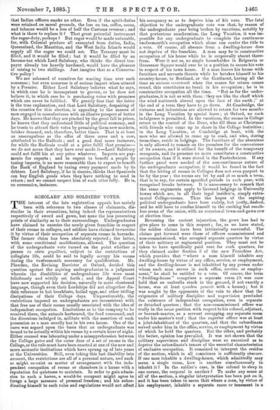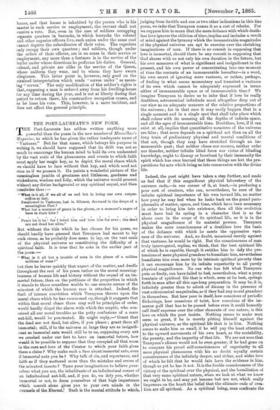SCHOLARS' AND SOLDIERS' VOTES.
THE interest of the late registration appeals has mainly been with reference to two classes of claimants, dis- similar in their avocations, being indeed the representatives
respectively of sword and gown, but none the less presenting points of similarity as to their surroundings. Undergraduates have claimed to exercise the newly given franchise in respect of their rooms in colleges, and soldiers have claimed to exercise it by virtue of their occupation of separate rooms in barracks.
The former claim has been absolutely rejected ; the latter, with some conditional modifications, allowed. The question
of the undergraduate vote turned on the point whether a person in statu pupillari, subject to the restrictions of collegiate life, could be said to legally occupy his rooms during the twelvemonth necessary for qualification. Mr. Plowden, the Revising Barrister at Oxford, decided this question against the aspiring undergraduates in a judgment wherein the disabilities of undergraduate life were most felicitously and wittily set forth ; and the Appeal Court have now supported his decision, naturally in more chastened language, though even their Lordships did not altogether dis- dain reference to hot breakfasts, boiled eggs, and other trifling dissipations of their College days. Unquestionably, the restrictions imposed on undergraduates are inconsistent with that free use of their rooms usually associated with the idea of independent occupation. Limitations as to the company to be received there, the animals harboured, the food consumed, and the diversions indulged in, militate with the assertion of such possession as a man usually has in his own house. One of the cases was argued upon the basis that an undergraduate was bound to be actually within his rooms by a certain hour of night. Either counsel was labouring under a misapprehension between the College gates and the outer door of a set of rooms in the College, or the rule must have been enacted at one of the new and more monastic institutions which have sprung up of late years at the Universities. Still, even taking this last disability into account, the restrictions are all of a personal nature, and such as might co-exist as matter of arrangement with the inde- . pendent occupation of rooms or chambers in a house with a reputation for quietness to maintain. In order to gain admis- sion to such a haven, a would-be occupant might agree to forego a large measure of personal freedom ; and his subor- dinating himself to such rules and regulations would not affect his occupancy so as to deprive him of his vote. The fatal objection to the undergraduate vote was that, by reason of the undergraduate year being broken by vacations, notably by that portentous anachronism, the Long Vacation, it was im- possible for any undergraduate to complete the continuous twelvemonth's occupation which alone can confer the title to a vote. Of course, all absence from a dwelling-house does not deprive of the franchise. A man may be in constructive occupation of his house while he is corporeally absent there- from. Were it not so, no single householder in Belgravia or Grosvenor Square would ever be in a position to secure his vote in respect of his town house. If a man leaves his house with furniture and servants therein while he betakes himself to his country-house, to Scotland, or the Continent, having all the time an animus revertendi when the season for return comes round, this constitutes no break in his occupation ; he is in constructive occupation all the time. " But as for the under- graduates, it is not so with them ; they are like the chaff which the wind scattereth abroad upon the face of the earth ;" at the end of a term they have to go down. At Cambridge, the virtuous and industrious are allowed to return for two months in the Long Vacation by special leave ; at Oxford, no such indulgence is permitted. In the vacations, the rooms in College revert to the control of the Dons, who fill them at Christmas with friends who come up to share in the College festivities ; in the Long Vacation, at Cambridge at least, with the men who are allowed to come up to read, and who, during term-time, reside in lodgings. The furniture of the absentees is only allowed to remain on the premises for the convenience of its owners, and is utilised for the benefit of the temporary occupants, and- its presence no more constitutes a constructive occupation than if it were stored in the Pantechnicon. If any further proof were needed of the non-continuous nature of the undergraduate occupation, it would be found in the fact that the letting of rooms in Colleges does not even purport to be by the year ; the rooms are let by and at so much a term, that is to say, for certain specified periods in each year, with recognised breaks between. It is unnecessary to remark that the same arguments apply to licensed lodgings in University towns which are, in all their legal incidents, simply extra- mural College-rooms. Thus the hopes of the aspiring political undergraduate have been rudely, but justly, dashed, and he will have to confine himself to the exciting but result- less arena of the union, with an occasional town-and-gown row at election time.
Reversing the ancient. injunction, the gown has had to give place to arms in this respect ; for, as we have stated, the soldier claims have been intrinsically successful. The claims put forward were those of officers commissioned and non-commissioned, who occupied separate quarters by virtue of their military or regimental position. They must not be taken to have specifically paid rent for such quarters, for they claimed under Section 3 of the new Franchise Act, which provides that " where a man himself inhabits any dwelling-house by virtue of any office, service, or employment, and the dwelling-house is not inhabited by any person under whom such man serves in such office, service, or employ- ment," he shall be entitled to a vote. Of course, the term " dwelling-house" comprises a separate room (it was once held that an umbrella stuck in the ground, if not exactly a house, was at least ejusdem generis with a house) ; but it was sought by the opponents of the vote to show that the exigencies of military discipline and supervision precluded the existence of independent occupation, even in separate or detached quarters ; that the non-commissioned officer was really in the same position with respect to his colonel, adjutant, or barrack-master, as a servant occupying any separate room under his master's roof ; that the superior officer was at least a joint-inhabitant of the quarters, and that the subordinate served under him in the office, service, or employment by virtue of which he held the quarters. But the other, and probably the better, opinion has prevailed. It was not shown that the military supervision and discipline were so exercised as to deprive the subordinate's tenure of the essential characteristics of exclusive occupation. It remained to interpret the residue of the section, which in all conscience is sufficiently obscure. If one man inhabits a dwelling-house, which admittedly may mean a single room, how is another simultaneously to inhabit it ? In the soldier's case, is the colonel to sleep in one oorner, the corporal in another I To make any sense at all of the section, a singular interpretation has been put on it, and it has been taken to mean that where a man, by virtue of his employment, inhabits a separate room or tenement in a
house, and that house, is inhabited by the person who is his master in such service or employment, the servant shall not receive a vote. But, even in the case of soldiers occupying separate quarters in barracks, in which barracks the colonel and other superior officers live, such union under the same roof cannot deprive the subordinates of their votes. The superiors only occupy their own quarters ; and soldiers, though under the orders of their officers, are in no sense in their service or employment, any more than a footman is in the service of the butler under whose directions he performs his duties. General, colonel, and private are alike in the service of the Queen, whose uniform they wear, and to whom they have sworn allegiance. This latter point is, however, only good on the strained interpretation which reads " serves under " as mean- ing " serves." The only modification of the soldier's rights is that, supposing a man is ordered away from his dwelling-house for any time during the year, and is not at liberty during that period to return there, his constructive occupation ceases, and so he loses his vote. This, however, is a mere incident, and does not affect the general principle.















































 Previous page
Previous page